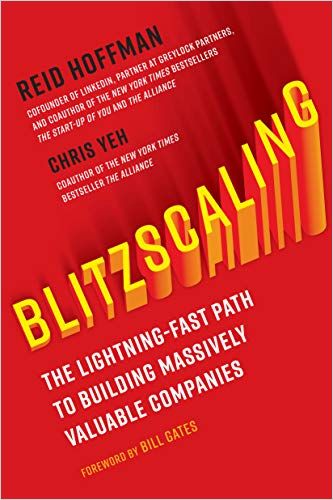Toss what you know about strategy and start running.

No Time to Spare
Abandon traditional strategies
The author’s professional accomplishments testify to their expertise: Reid Hoffman served as COO of PayPal, co-founded LinkedIn and is the host of the popular Masters of Scale podcast; Chris Yeh, co-founder and general partner of Wasabi Ventures, has worked with more than 100 high-tech start-ups since 1995. To join giants like Facebook or Apple, they write, you need to embrace risk. Their promise: “Blitzscaling” – done right – can catapult your $10 million company to a $10 billion company. The authors provide a step-by-step approach to this new model, which requires abandoning traditional business strategies and rules in favor of innovative operational and management practices.
The authors’ peers admire this book. Airbnb CEO Brian Chesky said, “I can’t think of any other work that so perfectly captures the specific challenges – and opportunities – that a company faces at every stage of growth.” Adam Grant, the bestselling author of Originals and Give and Take, raves, “This is the best book I’ve ever read on how to grow a company rapidly — and when that’s even worth trying in the first place.”
“Move Fast and Break Things”
Business strategy used to involve doing research, making a plan and anticipating certain results. Hoffman and Yeh reject that approach: Because technology moves at such a lightning speed, they view getting products to market as paramount. Blitzscaling builds on Mark Zuckerberg’s “Move fast and break things.” Scale up your business quickly, the authors advise, even at the cost of efficiency and accuracy.
Hoffman and Yeh vest in the “S-Curve” path exemplified by Facebook or Google: Burn your way to the top in the early stages, they recommend, then gear down as you become an industry leader. When growth plateaus, blitzscale new initiatives.
When you design your business model to leverage network effects, you can succeed anywhere.Reid Hoffman and Chris Yeh
By blitzscaling, you take your competitors by surprise, leverage your lead to create long-term competitive advantages and attract capital because investors favor market leaders. As a strategy it’s therefore simultaneously offensive and defensive. But Hoffman and Yeh caution that blitzscaling can get out of control. They urge you to bear in mind that your company must adjust continuously.
Hoffman and Yeh identify network effects as one crucial factor that makes blitzscaling work: The more people use a product or service, the more valuable it becomes for individual users.
“Rapid guesstimates”
Along with a lot of other counterintuitive advice, Hoffman and Yeh avow you must embrace “rapid guesstimates,” tolerate irate customers and accept inefficient spending. They explain that Airbnb was still a small company in 2011 when Wimdu, a European rival, tried to capture Airbnb’s lucrative market with an almost identical business model. Airbnb had no time to construct an elaborate strategy. It acted fast – at great expense – to forestall Wimdu. But, the authors emphasize, blitzscaling isn’t a long-term strategy. It can stop working when your company hits its market’s ceiling.
While blitzscaling requires risk-taking, it doesn’t require unnecessary risk-taking.Reid Hoffman and Chris Yeh
Hoffman and Yeh nail many points quickly. At times, their book resembles a printed-out PowerPoint presentation. Still, they deliver punchy advice in worthwhile bite-size chunks. Among their dictates: Change your small teams to large teams and your generalists to specialists. Founders must manage managers. Internal dialogue must become internal broadcasting. Inspiration fuels startups, but blitzscaling depends on identifying and tracking crucial data. You may disregard rules as you begin, but the authors believe that scaling up demands strong company ethics. And, if you are a founder, they dictate that you must scale yourself by delegating and focusing on strategies. Learn all you can.
And, authors keep firing fast guidance: accept chaos, hire people who match the stage your business is in, avoid perfectionism, release flawed products and let consumers tell you what to fix. Let some problems remain unsolved. Build customer service later. Raise as much money as you can and build a healthy corporate culture.
Blitzscaled
Hoffman and Yeh regard two companies as exemplars of blitzscaling: Zara scales clothing production and distribution using “fast fashion,” holds only six days of inventory and produces 10,000 styles per year. That’s blitzscaling in action.
And, in 2010, Chinese entrepreneur Jack Ma developed WeChat to seize the emerging instant messaging market. Less than 16 months later, WeChat had 100 million users, and it is now worth $500 billion.
As the authors demand that you vest in ethics, they posit that instead of revenue, a nonprofit can measure its blitzscaling success by how much it improves people’s lives. For example, Hoffman and Yeh cite with admiration the Bill and Melinda Gates Foundation, which targeted malaria prevention by expanding mosquito net availability. Between 2000 and 2012, the Gates Foundation helped reduce malaria deaths by 42%.
Your success is contingent upon society functioning properly.Reid Hoffman and Chris Yeh
Seriously, what do Hoffman and Yeh have to prove? And how much richer could they possibly be? This book seems to spring from a genuine desire to mentor entrepreneurs, and their authorial tone echoes that stance. They prove witty and direct, emphasize ethics and – to a surprising degree – offer actionable, real-world, hard-headed advice that startups can actually follow. Most successful CEO books turn out to be extended exercises in self-backpatting. The authors waste not a word on self-congratulation. They want you to learn and to succeed.












